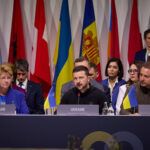Next step in arms control: Putin must be pragmatic
By John Erath | June 18, 2021

This article is part of a collection of expert commentaries on the Biden-Putin summit held in Geneva on June 16, 2021. To read other articles in the collection, click here.
The June 16 Geneva Summit produced little mention of arms control, and that is probably a positive sign. Arms control agreements, at least good ones, do not appear overnight. They are products of years of detailed talks and painstaking negotiations. The news that experts from both sides will meet to discuss next steps is a good result on its own. There has been no progress on arms control for a decade, and as the process moves forward, it will be important to ensure that it focuses on results—not talks between governments as an end in themselves.
It is significant that the White House statement frames the goal as “future arms control and risk reduction measures.” Not only does this keep focus on the actual goal, it also looks to the future. Should the process stay on track, it will aim for new measures to reduce numbers and not waste effort trying to revisit the past. It may be desirable to resurrect the Intermediate-Range Nuclear Forces Treaty, but four successive US administrations have tried to engage Russia on its violations without success. Although it was disappointing that there was no apparent discussion of Russia’s development of new and destabilizing types of weapons, the potential is there to address this later.
Next, the talks should be in the right channel. President Putin stated that the State Department would be meeting with the Russian Ministry of Foreign Affairs to discuss next steps. This is the right tasking; it should be a diplomatic process in which experts can look past politics for common ground. The Biden administration will send an early signal of its expectations for success when it decides which bureau at State will take the lead. If the Arms Control bureau is taking point, rather than European Affairs, it will signal that the president anticipates practical discussions and not an endless process. Other agencies will need to be involved should discussions turn to specifics, but the presidents appear to be starting in the correct lane.
Finally, it is significant that the White House chose to label the future talks a “bilateral Strategic Stability Dialogue.” By keeping the process bilateral, Biden has chosen to simplify and keep China and other nuclear weapons states out, a decision that points at a desire to achieve faster results. Using the term “strategic stability” has been a long-term Russian goal. It is understood in Moscow to mean that US missile defense will be open to discussion. Given that such defenses cannot currently threaten Russia’s deterrent, both the Obama and Trump administrations declined to use “strategic stability,” preferring to focus on arms control. Doing so now is a clear signal that the United States is ready for progress and for discussions of a broader range of issues, including new types of nuclear systems not covered by existing treaties. Although use of the term “strategic stability” will be seen in Moscow as a sign of weakness, it can and should be used to signal that the United States has shown flexibility, and the success or failure of the next step in arms control will depend largely on Putin taking a similarly pragmatic approach.
This article is part of a collection of expert commentaries on the Biden-Putin summit held in Geneva on June 16, 2021. To read other articles in the collection, click here.
Together, we make the world safer.
The Bulletin elevates expert voices above the noise. But as an independent nonprofit organization, our operations depend on the support of readers like you. Help us continue to deliver quality journalism that holds leaders accountable. Your support of our work at any level is important. In return, we promise our coverage will be understandable, influential, vigilant, solution-oriented, and fair-minded. Together we can make a difference.
Keywords: Biden, Putin, Russia, United States, nuclear weapons
Topics: Analysis, Nuclear Risk, Nuclear Weapons, Opinion















